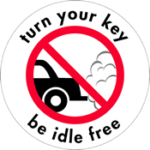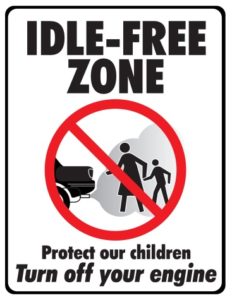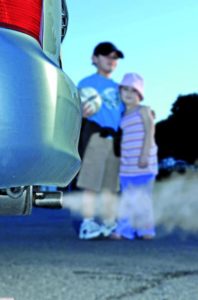
By Erika Roberts
So many of us are delighted the kids are in school full-time this fall. I for one will be skipping them hand-in-hand down the sidewalk on their first day back, even if my first and fourth graders are dying of embarrassment. The only part of the academic year that I dread happens daily during arrival and dismissal: dozens upon dozens of vehicles running their engines while parked as the drivers wait to pick up or drop off students.
With everything we have done to keep our children protected during a global pandemic, from remote learning to wearing masks to social distancing to getting vaccinated, it is clear their health and safety in and out of the classroom are a high priorities for us. Yet every day we subject our children and our town to significant amounts of air pollution from illegal idling, especially at our schools.
Know the Law
Idling is when your vehicle engine is running, but your vehicle is not moving. People idle for many reasons. It seems like such an innocuous thing at the beginning or end of a car ride (checking your phone, listening to the end of a radio program), but it is far from harmless. The harm to our cars, our health, and our environment is well documented by science, which is why many countries, cities, and states have had anti-idling laws on the books for years.
Of course there are times when idling is necessary, like waiting at a red light or being stuck in traffic, but the vast majority of times it is unnecessary, and unnecessary idling is against the law in Massachusetts (Chapter 90 Section 16A). The first offense is a fine of $100 and every subsequent offense is an additional $500. The Belmont Citizens Forum reported on this issue (“Idling Harms Your Car and Your Health,” Belmont Citizens Forum Newsletter, January 2017). Still, many people either don’t know the law or choose not to obey it.
Specifically, Massachusetts state law prohibits idling in school zones, regardless of the time of day or time of year. That means we all must turn off our vehicles when stopped in school zones, even in the middle of the summer, or on a Monday holiday, or at midnight. It doesn’t matter if school is in session or if children are present. This law applies to passenger vehicles, delivery trucks, and school buses, with very few exceptions.
Furthermore, a “school zone” is defined as any area within 100 feet of the school property, not just the physical building. It also includes the parking lots, athletic fields, and playgrounds used for school purposes or functions even if they are owned by the town. For example, at Winn Brook School, the school zone includes Joey’s Park, the soccer fields, baseball diamond, and tennis courts. This law applies to school zones at any public or private accredited preschool, elementary, secondary, vocational school, or Head Start facility.
Outside of school zones, unnecessary idling is limited to five minutes in Massachusetts. Never leave your car running unattended. It violates motor vehicle laws as well anti-idling laws, and it is a serious safety risk.
Understand the Concern
Idling contributes greatly to air pollution, which is a major public safety, health, and environmental concern. Many people think exhaust goes up and away after it leaves your tailpipe, but it is not that simple. The US Environmental Protection Agency has an Idle-Free Schools Toolkit to help support healthier school environments and describes the risks:
“Idling vehicles contribute to air pollution and emit air toxins, which are pollutants known or suspected to cause cancer or other serious health effects. Monitoring at schools has shown elevated levels of benzene, formaldehyde, acetaldehyde, and other air toxics during the afternoon hour coinciding with parents picking up their children. Children’s lungs are still developing, and when they are exposed to elevated levels of these pollutants, children have an increased risk of developing asthma, respiratory problems, and other adverse health effects. Limiting a vehicle’s idling time can dramatically reduce these pollutants and children’s exposure to them.”
So we’re not just talking about global pollution. We’re talking about the immediate impacts locally, here where we live, work, and play—and where our kids go to school. Vehicle emissions are more concentrated near the ground where children breathe, and children are also more susceptible to the effects because they have faster breathing rates.
Monitoring at schools has shown elevated levels of benzene, formaldehyde, acetaldehyde, and other air toxics during the afternoon hour coinciding with parents picking up their children.
This is why it makes sense that Massachusetts forbids idling in school zones. On a cold day you can see the clouds of exhaust settling around the cars and on the sidewalk, but on most days it is invisible: out of sight and out of mind. Even with the windows up and doors closed, you and your passengers are not protected from emissions in your car, but it is worse for people outside. What’s more, the school’s air intakes draw these pollutants directly into the classrooms.
Idling our engines for just one minute produces as much carbon monoxide as smoking three packs of cigarettes. Can you imagine how differently we would react if the children were dismissed into a parking lot full of that much second-hand smoke every day?
It is easy to see how these impacts become cumulative. Every driver coming to school that idles “just for a few minutes” (although I have often witnessed cars idling for upwards of a half an hour), times the dozens of cars at pick up, times all the schools in our town, times the number of school days each year.
Be the Change
Through education, reminders, and practice this will become second nature to all of us, just as “buckling up” became after seat belt laws went into effect. Most of us don’t “click it” to avoid the “ticket,” or even because we are consciously thinking about our safety. We do it because it has become part of our driving routine. Practice making this your new driving routine:
- Turn off your engine as soon as you stop your vehicle, and
- Do not turn your car on until you are ready to drive away safely.
Even car manufacturers recommend powering down your vehicle if you plan on stopping for more than 10 seconds. Idling is terribly inefficient, and it wastes gas and puts more wear and tear on parts than merely restarting the engine. Cars no longer need to be “warmed up” before driving even in cold weather, and the interiors heat and cool much faster in drive than while idling.
Teach your children about the anti-idling law. Mine love to be the “backseat police” reminding the adults in their life what the rules are. It may seem small, but we are also teaching these young people to advocate for their own health and safety
Idling our engines for just one minute produces as much carbon monoxide as smoking three packs of cigarettes.
Spread the word to all the drivers in your family: sitters, nannies, grandparents, the teenagers getting learner’s permits, and especially those drivers responsible for drop-off and pick-up of students at school. Don’t idle. It is common sense, and it is also the law.
Breathe Easier
Wouldn’t it be amazing if with the push of a button we could make an immediate beneficial impact on the local air quality around our schools, in Belmont, as well as the global environment?
What if by pushing this same button we also would comply with state laws, avoid fines, and save ourselves money every year?
Pushing this button is simpler than recycling, it’s easier than composting, and you don’t need solar panels on your roof or an electric car in your driveway to do it.
All we need to do is stop unnecessary idling. A small gesture with huge benefits is at our fingertips. So go ahead and push that ignition button to off, pat yourself on the back, and breathe easier.
Erika Roberts was an environmental consultant for more than a decade with a focus on conducting environmental studies and obtaining federal, state, and local permits for commercial- scale wind-energy projects. She is currently co-chair of the Winn Brook Safe Routes to School Committee




Sorry, the comment form is closed at this time.